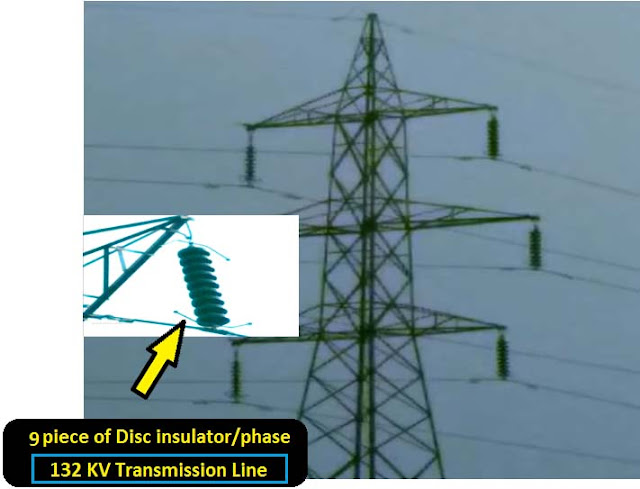How to Know the KV of a Transmission Line? Easy Way
Hey, today we are going to learn, how to know or identify the KV of a transmission line. There is a very easy way to identify the KV rating of a transmission line. So let's go to know.
We know that all the electric poles used for the overhead power transmission system have some insulators. The electric wires are mounted to the electric poles through insulators to maintain insulation between the current-carrying transmission line and the electric pole. There are various types of insulators used in power transmission systems according to voltage ranges. Generally, in a high voltage power transmission system such as more than 11KV, the disc insulators are used. The most important thing that must be known to you that is, the disc insulator used in the transmission line is rated for 11KV. So, 1 disc insulator = 11KV
So, if in a transmission line only one disc insulator per phase is connected then the transmission line carrying 11KV. For the 11KV transmission line, generally Double Pole(DP) structure is used.
In a transmission line, if three pieces of disc insulators per phase are connected, then the KV of the transmission line is 33KV. For the 33KV transmission line, generally, Four Pole structure is used. Sometimes double-pole structure is also used.
Pin insulators are also used in 11KV and 33KV transmission lines with single-pole structure 'V' cross arms. For 11KV small-size pin insulators are used and for 33KV large-size pin insulators are used.
For 66KV and 132KV transmission lines, Towers are used. There mainly two types of insulators are used, one is a Suspension type disc insulator, and another one is a Strain type disc insulator.
If in a transmission line, five or six pieces of disc insulators per phase are connected then the transmission line carries 66KV. Generally, five pieces of disc insulators per phase are used for suspension type and six pieces of disc insulators per phase are used for strain type.
If in a transmission line, nine or ten pieces of disc insulators per phase are connected then the transmission line carries 132KV. Generally, nine pieces of disc insulators per phase are used for suspension type and ten pieces of disc insulators per phase are used for strain type. And you can see a wire at the top of the tower that does not use any insulator. It is basically an earthing conductor. It sometimes helps to protect the current-carrying conductors from the lighting current by grounding them.
Read Also:
Thank you for visiting the website. keep visiting for more updates.
So, if in a transmission line only one disc insulator per phase is connected then the transmission line carrying 11KV. For the 11KV transmission line, generally Double Pole(DP) structure is used.
In a transmission line, if three pieces of disc insulators per phase are connected, then the KV of the transmission line is 33KV. For the 33KV transmission line, generally, Four Pole structure is used. Sometimes double-pole structure is also used.
Pin insulators are also used in 11KV and 33KV transmission lines with single-pole structure 'V' cross arms. For 11KV small-size pin insulators are used and for 33KV large-size pin insulators are used.
For 66KV and 132KV transmission lines, Towers are used. There mainly two types of insulators are used, one is a Suspension type disc insulator, and another one is a Strain type disc insulator.
If in a transmission line, five or six pieces of disc insulators per phase are connected then the transmission line carries 66KV. Generally, five pieces of disc insulators per phase are used for suspension type and six pieces of disc insulators per phase are used for strain type.
If in a transmission line, nine or ten pieces of disc insulators per phase are connected then the transmission line carries 132KV. Generally, nine pieces of disc insulators per phase are used for suspension type and ten pieces of disc insulators per phase are used for strain type. And you can see a wire at the top of the tower that does not use any insulator. It is basically an earthing conductor. It sometimes helps to protect the current-carrying conductors from the lighting current by grounding them.
Read Also:
- Line Capacitance and Earth Capacitance Effect in Transmission Line
- Why 400 KV not directly Stepped Down to 33 KV in Transmission Line?
- Main Purpose of Using Neutral Grounding Resistor
- Why DC Supply is used for Control Circuit in Substations, not AC?
Thank you for visiting the website. keep visiting for more updates.






